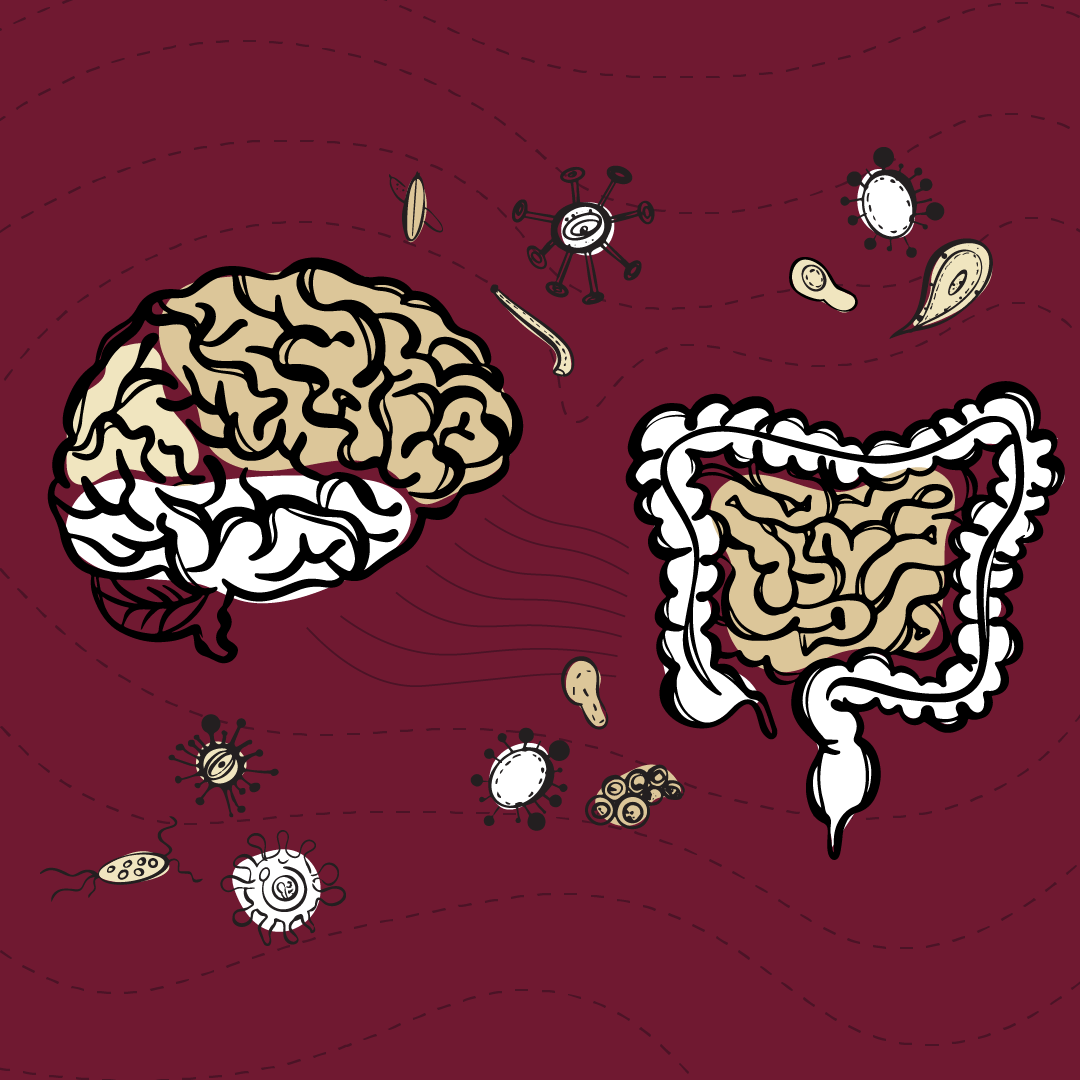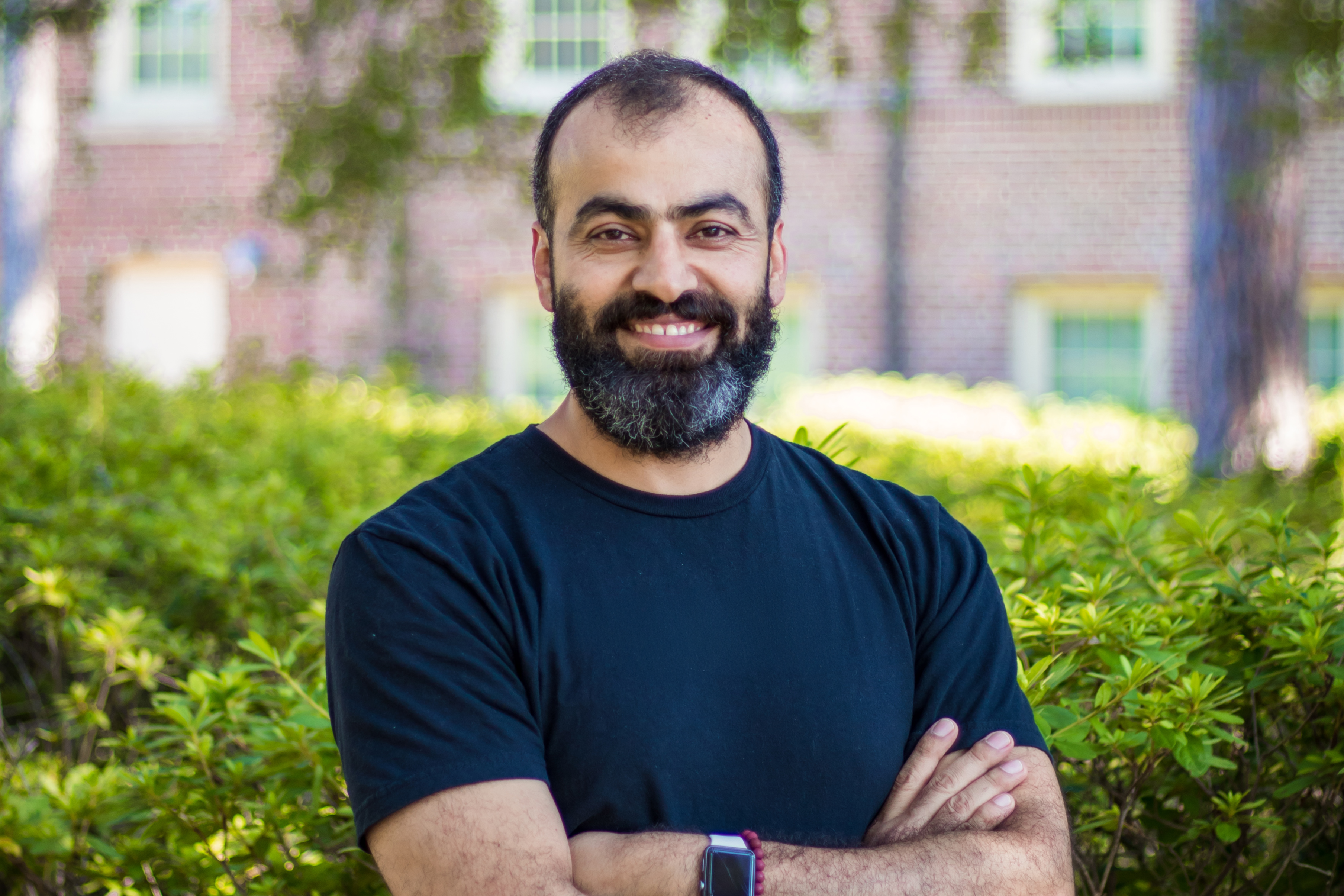
6 minute read
FOOD ON THE BRAIN
From Alzheimer’s disease prevention to nutrition and gut health studies on legumes, almonds, watermelon, and peanut butter, Assistant Professor Ravinder Nagpal’s research explores a wide range of topics, all tied to one key factor: the gut microbiome.
By Melissa Powell
As director of The Gut Biome Lab at FSU, Dr. Nagpal’s work investigates how the collection of trillions of bacteria, fungi, and other microbes inhabiting our gastrointestinal tract could hold the power to transform not only our digestive health and physical well-being, but also our cognitive health. And when it comes to Alzheimer’s disease and cognitive impairment, these discoveries could change the way we approach disease prevention and management.

Several studies have shown that patients with Alzheimer’s disease or related dementias have an imbalanced gut microbiome.
“But we don’t know which microbes actively contribute to the disease and which are merely casually associated,” Nagpal said.
THE GUT-BRAIN CONNECTION IN ALZHEIMER'S DISEASE
With research funding from the Infectious Diseases Society of America and the Florida Department of Health, Nagpal’s team is studying a potential link between hospital-acquired infections and Alzheimer’s disease risk and progression. Pathogens associated with these infections may trigger systemic inflammation, especially in patients already taking antibiotics.
When patients are hospitalized for sepsis or traumatic brain injury, they often stay in the ICU under critical care for multiple weeks and receive antibiotics as the first line of therapy. “The antibiotics deplete a lot of beneficial bacteria in the gut and diminish the diversity of the microbiome,” Nagpal said.
Pathogens are harmful microbes that cause disease. Some pathogens in our gut, usually kept in check by the microbiome’s balance, can become opportunistic when antibiotics weaken or wipe out beneficial bacteria.

Those pathogens are smarter and sometimes have or acquire antibiotic resistance. So, in those situations, pathogens start dominating the gut because now they have an opportunity to outgrow when there’s less competition in the gut,” Nagpal said.
Studies have shown that sepsis patients face an increased risk of developing dementia within 10 years or more after being discharged. Antibiotic-induced pressure on the microbiome could be a key factor.
“Antibiotics-induced imbalances in the gut microbiome increase the risk of leaky gut, meaning the gut barrier becomes more permeable, allowing more substances to enter the bloodstream,” he said. Some pathogens that proliferate during this microbial imbalance are toxigenic, meaning they produce toxins or other harmful products. “Leaky gut combined with having a pathogen in your gut is double trouble because toxins can penetrate the blood from the gut and potentially reach the brain.” hormones, and sleep pattern gets impacted.”
Once pathogens or toxins breach the gut-blood-brain barrier, inflammation is triggered in the brain as a defense mechanism.
“The brain and immune system start producing inflammatory molecules to tackle the invading pathogens or toxins,” said Nagpal.
"That leads to a temporary state of neuroinflammation that can impair activities of the brain cells. A person’s memory and cognition may become weaker because the brain is inflamed and is devoting a lot of energy somewhere else; a patient’s appetite, hormones, and sleep pattern get impacted.”
In the long term, it also leads to the overproduction of amyloidbeta proteins, a key factor in the onset of Alzheimer’s disease. Amyloid-beta protein accumulation in the brain clouds the brain’s functioning and disrupts neuron and cell function. “Under that situation, the brain starts suffering in a big way in five, 10, 15 years, which may lead to the start of mild cognitive impairments that we usually don’t realize,” said Nagpal. “You might say, ‘he’s just getting old, he just can’t remember addresses anymore, or he has a habit of forgetting names,’ but this is how it all starts. The accumulation of this effect may lead to a more detectable form of impairments leading to dementia and, eventually, sometimes Alzheimer’s disease.”
NUTRITIONAL INTERVENTIONS FOR COGNITIVE HEALTH
Nagpal hopes this research contributes to the development of new nutritional interventions or pharmacological therapies, like probiotics or prebiotics, to help prevent cognitive decline and related diseases. It may also reveal specific cellular or molecular targets for future therapies.
Nagpal is also collaborating with researchers at the FSU College of Medicine to see if Mediterranean or ketogenic diets can improve gut health and, in turn, improve or prevent cognitive impairment.
“We are doing dietary intervention studies in older adults who may have mild cognitive impairments, as they could be at risk of developing Alzheimer’s disease or dementia later on,” he said.
“Our preliminary preclinical as well as clinical studies have shown that a diet combing Mediterranean and ketogenic diets rich in fiber and omega-3 fatty acids, is quite beneficial not only for the microbiome but also for neurocognitive health.”
These dietary intervention studies focus on people living in rural communities around Tallahassee, for whom there is little health-related data. “We have found that six to eight weeks of this dietary pattern is sufficient to induce positive changes in the microbiome,” he said. “These changes also correlated with improvement in amyloid and tau proteins in the brain of these patients.”
Ultimately, Nagpal’s research aims to improve cognitive health in aging populations using dietary, nutritional, and lifestyle medi cine routes. And research on Alzheimer’s is just one part of his expansive work.
SMALL CHANGES, BIG IMPACT
Other studies being conducted by Dr. Nagpal’s Gut Biome Lab include a U.S. Department of Agriculture-funded study exam ining the effects of pulses like lentils and chickpeas on gut and metabolic health in young adults; a National Watermelon Boardfunded study exploring watermelon’s impact on microbiome and metabolism in subjects with overweight and obesity; an Almond Board-funded study exploring the effect of almonds on gut and cardiometabolic health; and even a project funded by the National Peanut Institute investigating the influence of peanut butter on the microbiome and immune-metabolic health in children. Each of these studies furthers the lab’s goal of discovering how specific foods and prudent dietary patterns can be used as a powerful tool for improving health and preventing diseases.
Whether studying legumes or Alzheimer’s, Nagpal’s message remains clear: small, accessible, and prudent dietary changes can have lasting effects. “The microbiome is so easy to modify and is so easily controllable. You don’t have to totally shift your meal plan and sacrifice your favorite foods. Small tweaks here and there lead to big changes,” he said.
“Our gut health impacts our immunity, metabolism, behavior, social life, daily activities, exercise routines, sleep patterns, everything.”
Our mission is to find out how we can improve the gut microbiome in a way that also improves our health in other areas like cognitive, neurological, and metabolic health.
Nagpal’s research opens the door for both scientific and practical solutions that may help us better understand — and perhaps even help prevent — gut and cognitive disorders in aging populations. ∎











